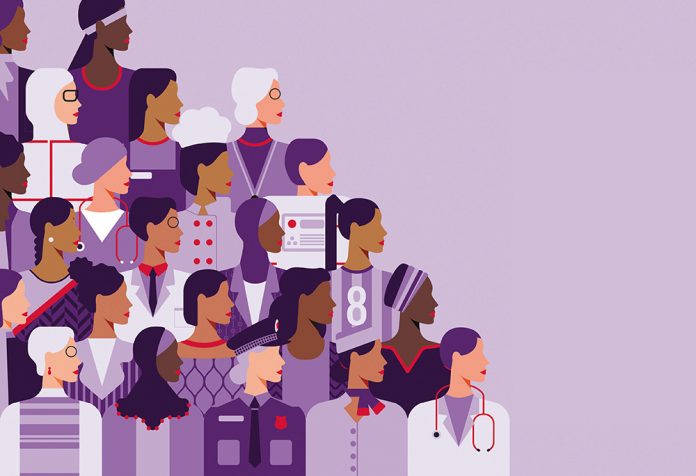International Women’s Day celebrates the social, economic, cultural, and political achievements of women highlighting the progress made towards gender equality but reminding us of the enormity of the task ahead.
The 2024 campaign theme is Inspire Inclusion to remind us that, when we inspire others to understand and value women’s inclusion, we forge a better world and that, when women themselves are inspired to be included, there’s a sense of belonging, relevance, and empowerment.
This year’s campaign calls for action to break down barriers, challenge stereotypes, and create environments where all women are valued and respected. Inspire Inclusion encourages everyone to recognize the unique perspectives and contributions of women from all walks of life, including those from marginalized communities.
Scotland stands at the forefront of efforts to empower women in the workforce with an increased presence both in corporate boardrooms and as entrepreneurs successfully developing the small businesses which are essential to our economic wellbeing.
But empowering women is not just an altruistic aspiration, it is essential to Scotland’s economic development. Last year, there were over 2 million job vacancies in the technology sector, a sector in which only 26% of the workforce are female. In Scotland, our digital economy is faced with serious skill pressures and Equate Scotland have estimated that, by 2025, there will be only one qualified woman for every 115 technology jobs. UNESCO reports that on average there are 33.35 of researchers are female and only 35% of all students in STEM related fields of study are women.
Serious problems require imaginative solutions and Equate Scotland, in partnership with Capital City Partnership, The Royal Bank of Scotland (NatWest) and Code First Girls, have supported Ukrainian women who have resettled in Scotland to enter or return to tech careers. The programme offered free online courses such as introductions to coding as well as to DAT &SQL and provided career development support and work to bridge the digital divide and remove any technological barriers Ukrainian women may face through the provision of a laptop loan service.
Scottish organisations continue to invest in initiatives to address the lack of females taking up positions in the Science, Technology, Engineering and Math (STEM) sector and the University of Strathclyde’s partnership with the Weir Group to promote engineering as a career to girls has provided over 800 high school girls with the opportunity to experience a career in engineering through both in-person and virtual events.
Elevator, a social enterprise based in the North of Scotland has recently launched a new initiative called Ef3. Fully funded by the Scottish Government, Ef3 aims to support women who want to explore their potential and embark on a transformative journey to turn their aspirations into reality. The free six-week programme connects participants with like-minded women, to share experiences and build lasting connections running in the areas of South Glasgow, Angus and Moray.
Similar initiatives are happening worldwide with organisations such as the global energy and services group, ENGIE, supporting talented young women in STEM fields and investing in their professional development. Globally, ENGIE have supported hundreds of women by providing them with female mentors to share their passion for their profession and providing training to assist their professional development. Notable success stories include in Peru where ENGIE designed a project to provide financial support to academic highflyers allowing them to continue on their STEM study pathways until they are placed into their first job. Elsewhere, ENGIE is promoting the integration of women into technical professions and offering leadership opportunities with a 3-year training course.
Coinciding with COP28 in the UAE, the Scottish Government and Heriot-Watt’s Edinburgh Business School launched their Gender Equality Initiative. In collaboration with the Scottish Government’s International Development Fund, the initiative provides 30 fully funded distance learning opportunities on Heriot-Watt’s Edinburgh Business School’s Master of Business Administration (MBA) programme opening doors to business education for Zambian women.
Claudia Goldin, became the third woman to have won the Nobel Memorial Prize in Economic Sciences and the first to be honoured with the it solo, in 2023. The Harvard professor was awarded for advancing the world’s understanding of women’s progress in the work force. Dr Goldin hopes people would take away from her work the importance of long-term changes are to understanding the labour market.
Dr Anne-Marie Imafidion MBE, a trailblazer in the fields of business, mathematics and technology, has recently been announced as the new chancellor of Glasgow Caledonian University. Dr Imafidion has had a remarkable journey including passing GSCEs at age ten, and at twenty earnt a Master’s degree in Mathematics & Computer Science from the University of Oxford. Dr Imafidon is also co-founder and CEO of Stemettes, a social enterprise that aims to inspire and support girls, young women and non-binary young people to pursue careers in Science, Technology, Engineering, Arts and Maths (STEAM) so that women and non-binary people can be proportionally represented in the field.
The Scottish Chambers of Commerce will always be supportive of women who wish to reach their full potential and, by doing so, contribute to expanding the Scottish Economy.
International Women’s Day serves as a reminder of the progress made and the work that still lies ahead in achieving gender equality in Scotland’s workforce. By addressing the barriers and challenges that women face in the workplace, Scotland can harness the talent and potential of the female population so generating economic growth and prosperity for all.






